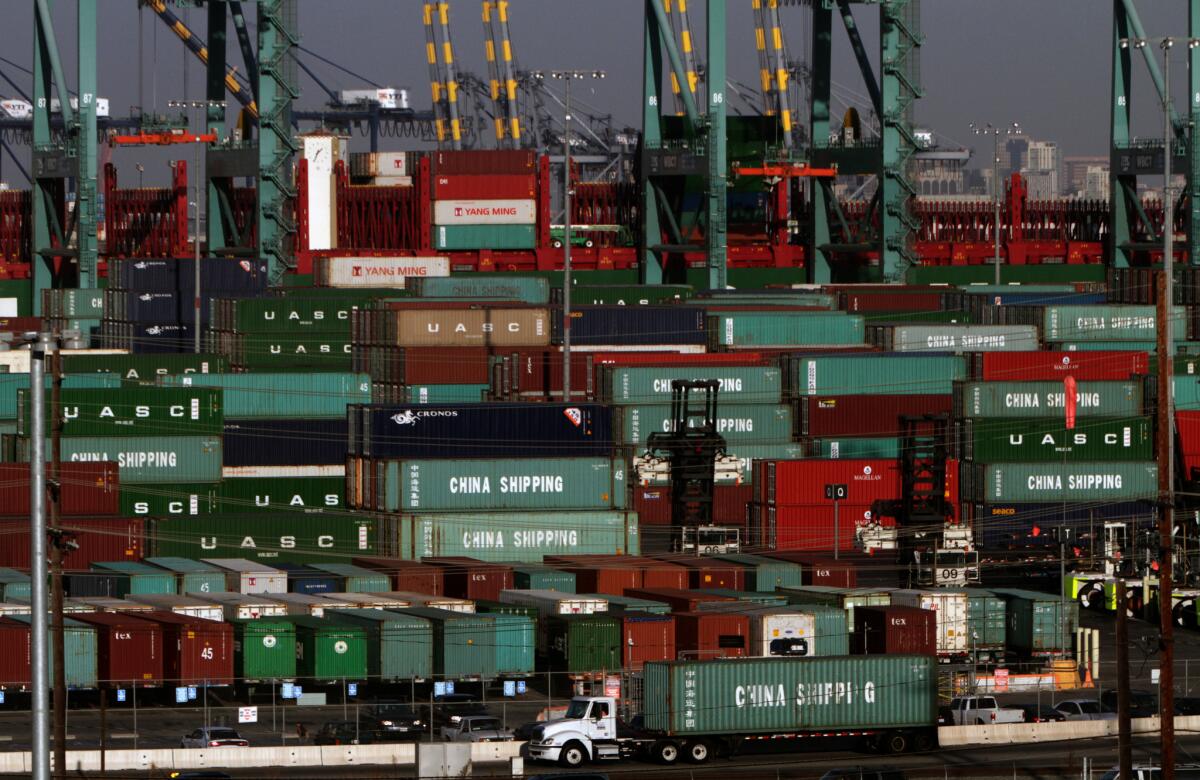Ship unloading resumes at West Coast ports amid labor dispute

- Share via
Dockworkers resumed unloading ships at West Coast ports Monday after employers suspended those operations over the weekend amid an ongoing labor dispute.
The Pacific Maritime Assn., an employer group representing shipping companies, said it stopped the weekend unloading of ships because it didn’t want to pay overtime to workers who, they allege, have deliberately slowed operations to gain leverage during contract talks. The union in Los Angeles and Long Beach has denied engaging in such a slowdown tactic.
The line of ships anchored off the Long Beach and Los Angeles coast waiting for berths grew over the weekend, from 28 on Friday afternoon to 31 on Sunday morning, according to the Marine Exchange of Southern California. By Monday morning there were 23 ships at anchor, after several moved into port in expectation that ship unloading would resume, said the group’s executive director, Capt. J. Kip Louttit.
Fears of a shutdown at the 29 West Coast ports have risen recently. Last week, the employer group’s president, Jim McKenna, said ongoing congestion could soon make the ports inoperable, leading employers to halt operations.
McKenna called on the union, which has been without a contract since July, to accept what he called an “all in” offer with increases in wages and pension. The union has not said publicly what it wants, citing a request from a federal mediator.
Hopes for a quick settlement were high two weeks ago after a tentative agreement was reached on the union’s role in repairing, maintaining and inspecting the trailers that truckers use to haul goods from the ports.
Employers say one major sticking point is a union demand that either side have the ability to unilaterally remove local arbitrators at the end of a labor contract. Currently, both sides must agree to remove an arbitrator, who resolves disputes while a contract is in place.
The Pacific Maritime Assn. said the alleged union slowdown tactics would become “a way of life” if such a change took place, because the union could “fire judges who rule against them.”
“The only reason those slowdowns don’t happen all the time is that arbitrators are able to order the ILWU back to work. If the ILWU has the right to continue slowdowns as a way of life without recourse, the impact on the waterfront could be catastrophic,” association spokesman Wade Gates said in a statement.
International Longshore and Warehouse Union spokesman Craig Merrilees declined to say what is being discussed. However, he called the Pacific Maritime Assn. statement regarding arbitration “inaccurate” and “irresponsible.”
Merrilees said the two sides did not meet Monday and he didn’t know when talks would resume. Employer spokesman Steve Getzug said talks were scheduled to resume Wednesday.
Employers and the union have been locked in bitter negotiations for a new West Coast dockworkers contract for nearly nine months — a period that has seen debilitating congestion up and down the West Coast.
Before slowdown allegations surfaced in November, L.A. and Long Beach already saw the worst bottlenecks in a decade because of the increased use of ever-larger container ships and a shortage of trailers.
The union says such industry-wide changes have caused the congestion up and down the coast, although employers contend that the union created the problem at other ports and made it worse in San Pedro Bay by withholding skilled crane operators.
The president of ILWU Local 13 in San Pedro, Bobby Olvera Jr., has denied slowing operations and said he limited the number of untrained crane operators available in L.A. and Long Beach for safety reasons after several accidents. He has said employers have failed to train enough workers.
The union has also said employers have worsened congestion by cutting back on night shifts. Employers say they stopped unloading nearly all ships at night in Los Angeles and Long Beach to focus on moving containers already on the terminals out of the ports, instead of adding new cargo to the mix.
If the ports shut down, it would be a blow to businesses already smarting from brutal congestion that has delayed shipments and led to a loss in sales.
Twitter: @khouriandrew
More to Read
Inside the business of entertainment
The Wide Shot brings you news, analysis and insights on everything from streaming wars to production — and what it all means for the future.
You may occasionally receive promotional content from the Los Angeles Times.











